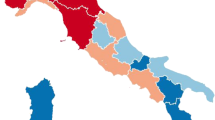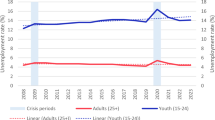Abstract
Decent work for poverty reduction and overall well-being has long been recognised by International Labour Organisation (ILO). However, ensuring it still remains a challenge in several countries across the globe. Treating regular employment as a form of decent work may be a misconception as a large number of regular salaried employment opportunities are devoid of any tenurial and social security benefits to workers, making them vulnerable, which is a crucial indicator of ILO’s notion of decent employment. Based on unit record data of large rounds of National Sample Survey on Employment and Unemployment, this paper disaggregates regular employment across public, private and informal enterprises and finds unequal access to quality employment opportunities to various socio-religious groups. It attempts to understand determinants of access to regular wage employment opportunities with a focus on quality jobs. Finally, the paper suggests measures to improve the availability and access to quality jobs to workers and promote inclusiveness in such job opportunities with a special focus on marginalised social groups in India.

Source: Average daily wage earnings are calculated from NSSO unit level data on Employment and Unemployment, 2011–12
Similar content being viewed by others
References
Fields, G.S. (2011), “Labor Market Analysis for Developing Countries” Labour Economics, Vol. 18, pp. S16–S22.
Chen, M., J. Vanek and J. Heintz (2006), “Informality, Gender and Poverty: A Global Picture”, Economic and Political Weekly, Vol. 41, No. 21, pp. 2131–2139.
D’Souza, E. (2015), “When will Formality became the Norm?”, The Indian Journal of Labour Economics, Vol. 58, No. 2, pp. 233–244.
Goldar, B.N. and Suresh R. (2017), “Contract Labour in Organised Manufacturing in India”, in Kannan, K.P., R.P. Mamgain and P. Rustagi (eds.), Labour and Development: Essays in Honour of Prof. T.S. Papola, Academic Foundation, New Delhi.
GoI-Ministry of Minority Affairs (2006), Social, Economic and Educational Status of Muslims Community of India, Government of India, Chairman: Justice Rajendra Sachar, New Delhi.
GoI-Ministry of Minority Affairs (2014), Report of Post Sachar Evaluation Committee, Government of India, Chairman: Amitabh Kundu, New Delhi.
Harriss-White, B. (2010), “Work and Wellbeing in Informal Economies: The Regulative Roles of Institutions of Identity and the State”, World Development, Vol. 38, No. 2, pp. 170–183.
IHD-ISLE (2014), India Labour and Employment Report, 2014: Workers in the Era of Globalisation, Institute for Human Development and Indian Society of Labour Economics, Academic Foundation, New Delhi
ILO (2014), World of Work Report 2014: Developing with Jobs, International Labour Organisation, Geneva.
Kannan, K.P. (2014), Interrogating Inclusive Growth: Poverty and Inequality in India, Routledge, New Delhi.
Madheswaran, S. (2017), “Is Affirmative Action Policy for Private Sector Necessary?” in Kannan, K.P., R.P. Mamgain and P. Rustagi (eds.), Labour and Development: Essays in Honour of Prof. T.S. Papola, Academic Foundation, New Delhi.
Mamgain, R.P. and S. Tiwari (2016), "Youth in India: Challenges of Employment and Inclusion", Journal of Social and Economic Development, Vol. 18, No. 1, pp. 85–100.
NCEUS (2009), The Challenge of Employment in India (Parts 1 and 2), National Commission for Enterprises in the Unorganised Sector, Government of India, Academic Foundation, New Delhi.
Papola, T.S. (2004), “Globalisation, Employment and Social Protection: Emerging Perspectives for the Indian Workers”, The Indian Journal of Labour Economics, Vol. 47, No. 3, pp. 541–550.
Papola, T.S. (2011), “Employment in Development: Connection between Indian Strategy and ILO Policy Agenda”, Economic and Political Weekly, Vol. 46, No. 10, pp. 62–67.
Papola, T.S. and P.P. Sahu (2012), ”Growth and Structure of Employment: Long-Term and Post-Reform Performance and Emerging Challenges”, ISID Occasional Paper Series, 2012/1, Institute for Studies in Industrial Development, New Delhi.
PTI (2015), Press Trust of India, 17 September, Lucknow.
Srivastava, R.S. and A. Naik (2017), “Growth and Informality in the Indian Economy”, in Kannan, K.P., R.P. Mamgain and P. Rustagi (eds.), Labour and Development: Essays in Honour of Prof. T.S. Papola, Academic Foundation, New Delhi.
Thorat, S., Aryama and P. Negi (2007), Reservation in Private Sector: Quest for Equal Opportunity and Growth, Rawat Publications, New Delhi.
Vegard, I. and P.S. Raghvendra (2006), “What the Food, Caste Signboard Hides and Employability in Small South India Eating Places”, Contributions to Indian Sociology, Vol. 40, No. 3, pp. 311–341.
Acknowledgements
The authors would like to express their gratitude to Professors Sukhadeo Thorat, Kaushik Basu, Pulin B Nayak, S. Madheswaran, Ajit Ghose, and participants of Panel Discussion on "Group Inequality, Identity and Inclusion in India" during 98th Annual Conference of Indian Economic Association in Hyderabad, 29 December 2015 for their valuable comments. The usual disclaimers apply.
Author information
Authors and Affiliations
Corresponding author
Rights and permissions
About this article
Cite this article
Mamgain, R.P., Tiwari, S. Regular Salaried Employment Opportunities in India: Nature, Access and Inclusiveness. Ind. J. Labour Econ. 60, 415–436 (2017). https://doi.org/10.1007/s41027-018-0101-z
Published:
Issue Date:
DOI: https://doi.org/10.1007/s41027-018-0101-z




